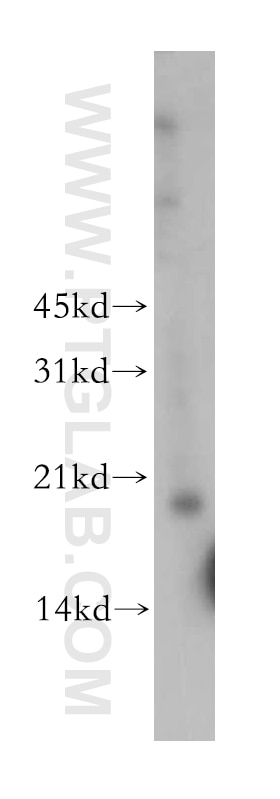Validation Data Gallery
Filter:
Tested Applications
| Positive WB detected in | human heart tissue |
Recommended dilution
| Application | Dilution |
|---|---|
| Western Blot (WB) | WB : 1:500-1:1000 |
| It is recommended that this reagent should be titrated in each testing system to obtain optimal results. | |
| Sample-dependent, Check data in validation data gallery. | |
Published Applications
| WB | See 1 publications below |
| IHC | See 1 publications below |
Product Information
12800-1-AP targets TPRKB in WB, IHC, ELISA applications and shows reactivity with human, mouse, rat samples.
| Tested Reactivity | human, mouse, rat |
| Cited Reactivity | human |
| Host / Isotype | Rabbit / IgG |
| Class | Polyclonal |
| Type | Antibody |
| Immunogen | TPRKB fusion protein Ag3551 相同性解析による交差性が予測される生物種 |
| Full Name | TP53RK binding protein |
| Calculated molecular weight | 175 aa, 20 kDa |
| Observed molecular weight | 20 kDa |
| GenBank accession number | BC029492 |
| Gene Symbol | TPRKB |
| Gene ID (NCBI) | 51002 |
| RRID | AB_2256289 |
| Conjugate | Unconjugated |
| Form | Liquid |
| Purification Method | Antigen affinity purification |
| UNIPROT ID | Q9Y3C4 |
| Storage Buffer | PBS with 0.02% sodium azide and 50% glycerol , pH 7.3 |
| Storage Conditions | Store at -20°C. Stable for one year after shipment. Aliquoting is unnecessary for -20oC storage. |
Background Information
TPRKB, also named as CGI 121, belongs to the CGI121/TPRKB family. It interacts with TP53RK/PRPK and is widely expressed in all tissues. This antibody is a rabbit polyclonal antibody raised against full length TPRKB of human origin.
Protocols
| Product Specific Protocols | |
|---|---|
| WB protocol for TPRKB antibody 12800-1-AP | Download protocol |
| Standard Protocols | |
|---|---|
| Click here to view our Standard Protocols |
Publications
| Species | Application | Title |
|---|---|---|
Exp Cell Res METTL5 enhances the mRNA stability of TPRKB through m6A modification to facilitate the aggressive phenotypes of hepatocellular carcinoma cell |
